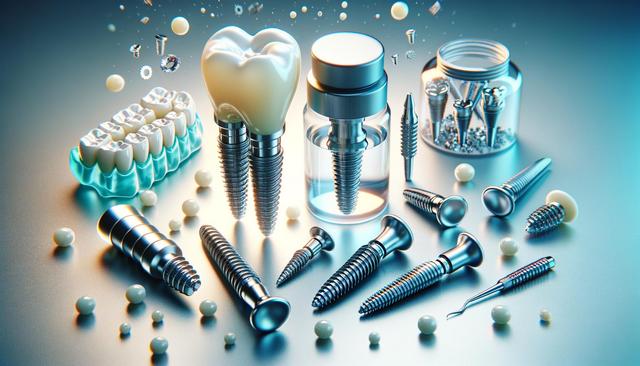Understanding Dental Implants
Dental implants are a modern approach to replacing missing teeth, offering a solution that closely mimics the appearance and function of natural teeth. Unlike traditional dentures or bridges, implants are surgically placed into the jawbone, acting as artificial tooth roots. This structure provides a stable foundation for crowns, bridges, or dentures, making them a long-term option for those looking to restore their smiles. Implants are typically made of titanium, a material known for its durability and biocompatibility, ensuring that the body accepts the implant without adverse reactions.
The process involves several steps, including initial consultation, imaging, surgical placement, and the eventual attachment of the prosthetic tooth. Healing time varies but generally takes a few months, during which the implant fuses with the bone in a process called osseointegration. Once this phase is complete, patients enjoy improved chewing function, better speech clarity, and a more confident smile. The versatility of dental implants makes them suitable for a wide range of needs, from single tooth replacement to full arch restoration.
Benefits Beyond Aesthetics
While the visual appeal of a complete smile is a major benefit, dental implants offer numerous functional advantages that contribute to overall oral health. One of the most significant benefits is the prevention of bone loss. When a tooth is missing, the jawbone beneath it can begin to deteriorate over time due to the lack of stimulation. Implants help maintain bone density by replicating the function of natural tooth roots.
Additional benefits include:
- Improved oral hygiene, as implants do not require altering adjacent teeth
- Enhanced comfort and stability compared to removable dentures
- Long-term cost-effectiveness due to their durability
- Increased confidence in social and professional settings
Moreover, dental implants do not slip or click during eating or speaking, which is often a concern with traditional dentures. Their secure fit allows individuals to enjoy a wide variety of foods without restrictions, contributing to better nutrition and quality of life.
Who Can Benefit from Dental Implants?
Dental implants are a viable option for a wide range of individuals, though certain criteria must be met to ensure successful outcomes. Ideal candidates are those with good general and oral health, adequate bone structure to support the implant, and a commitment to maintaining oral hygiene. While age is not necessarily a limiting factor, certain medical conditions or habits, such as uncontrolled diabetes or smoking, may affect healing and implant success.
Common scenarios where dental implants are recommended include:
- Replacing a single missing tooth
- Supporting a dental bridge when multiple teeth are missing
- Securing full or partial dentures for enhanced stability
- Restoring a full arch of teeth with implant-supported prosthetics
For those who lack sufficient bone density, procedures like bone grafting or sinus lifts may be necessary to prepare the site for implant placement. A thorough evaluation by a dental professional will help determine the most appropriate treatment plan based on individual needs and health status.
The Emotional Impact of Restored Smiles
Beyond physical health, the psychological effects of tooth loss can be profound. Missing teeth can lead to embarrassment, reduced self-esteem, and reluctance to engage in social interactions. Dental implants restore not only function but also a sense of normalcy, allowing individuals to smile, speak, and eat without self-consciousness.
Patients often report a marked improvement in their overall well-being after receiving implants. This emotional transformation can include:
- Greater self-confidence and willingness to smile
- Improved speech and communication comfort
- Reduced anxiety in social and professional environments
- Enhanced motivation to care for oral health
Such changes can lead to a more active lifestyle, better relationships, and even increased career opportunities. Restoring a smile with dental implants goes far beyond aesthetics—it can truly change lives by restoring dignity and self-assurance.
Maintaining Dental Implants for Long-Term Success
While dental implants are known for their longevity, proper care is essential to ensure their long-term success. Like natural teeth, implants require regular brushing, flossing, and routine dental checkups. Although implants are not susceptible to cavities, the surrounding gum tissue must remain healthy to prevent complications such as peri-implantitis—a condition similar to gum disease that can affect the stability of the implant.
Key maintenance tips include:
- Using a soft-bristled toothbrush and non-abrasive toothpaste
- Cleaning between implants and natural teeth with floss or interdental brushes
- Visiting a dentist at least twice a year for professional cleanings and exams
- Avoiding habits such as smoking or chewing hard objects that can damage the implant
With consistent care, dental implants can last for many years, often several decades. This makes them a reliable and valuable investment in one’s oral and overall health. Patients are encouraged to follow their dentist’s personalized care recommendations to preserve their restored smile for the long haul.
Conclusion: A Lasting Investment in Quality of Life
Dental implants offer a practical and life-enhancing solution for individuals dealing with missing teeth. By combining function, aesthetics, and emotional well-being, they represent a comprehensive approach to oral rehabilitation. Whether replacing a single tooth or restoring a full arch, implants provide stability, comfort, and confidence that traditional methods often cannot match.
For those considering this option, consulting with a qualified dental professional is the first step toward achieving a healthier, more complete smile. With the right care and guidance, dental implants can be a long-lasting investment in both oral health and overall quality of life.



Leave a Reply